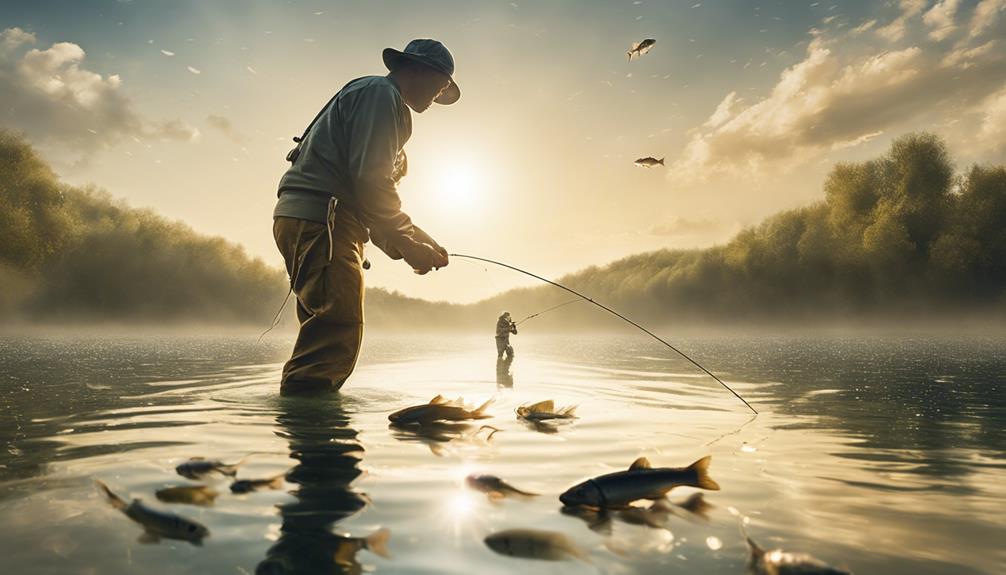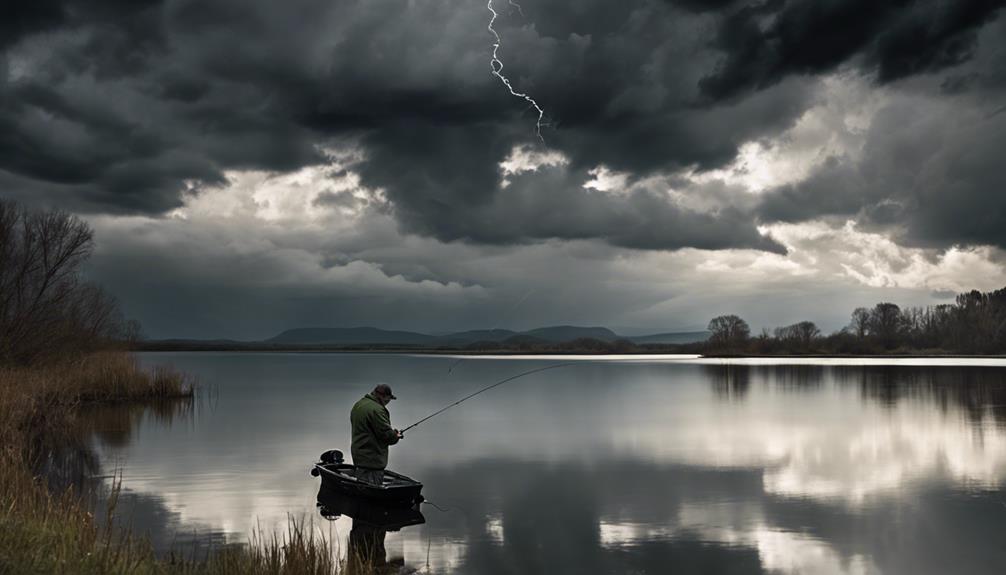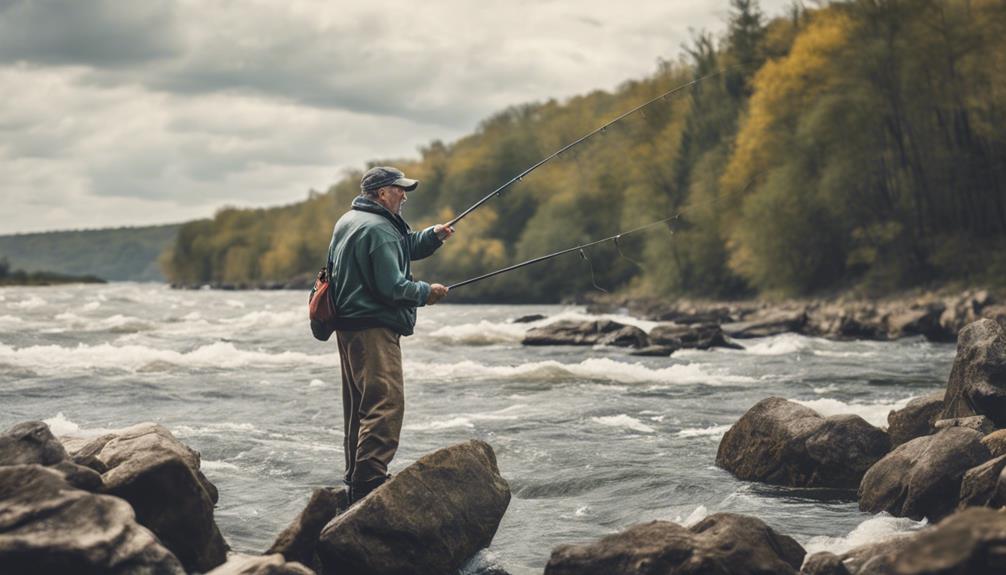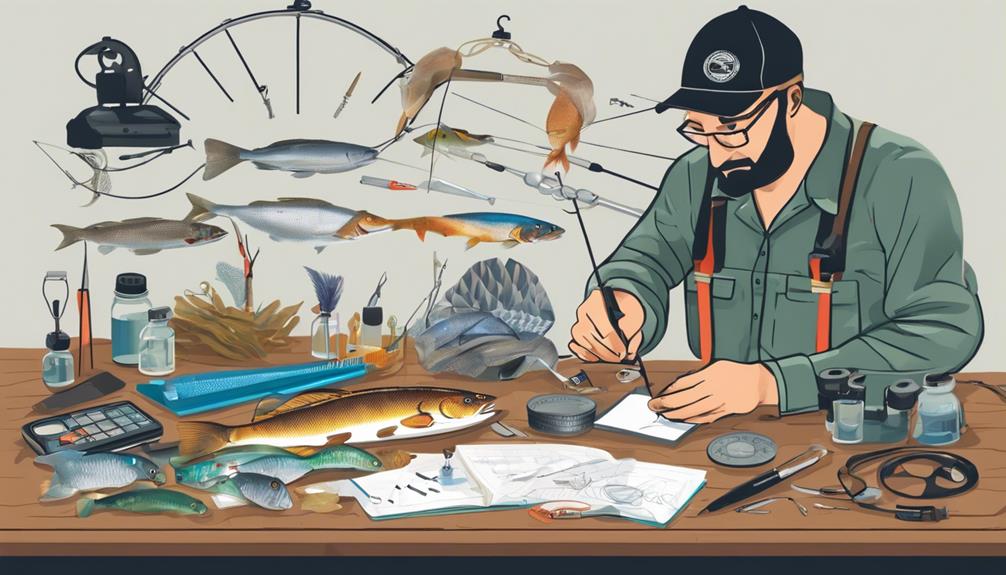When it comes to competitive angling, honing your casting technique can make a significant difference in your performance. Imagine effortlessly delivering your lure to that elusive spot where the big bass lurks, your every movement fluid and precise.
But casting is just the tip of the iceberg when it comes to mastering the art of competitive fishing. Stay tuned to discover how understanding fish behavior patterns can give you the edge you need to outsmart your competition and reel in those coveted trophies.
Perfecting Your Casting Technique
To improve your success in competitive angling, master the art of casting with precision and finesse. Precision casting is crucial in presenting your lure accurately to where the fish are. Advanced techniques, such as pitching and flipping, can help you reach tight spots where fish hide. To enhance your casting skills, incorporate casting drills into your practice routine. These drills not only improve your accuracy but also build muscle memory, making your movements more fluid and controlled.
When practicing precision casting, focus on your wrist and elbow movements. Use your wrist to control the speed and direction of the cast, while your elbow provides power and accuracy. Experiment with different casting angles and trajectories to adapt to varying fishing conditions. By mastering these techniques, you can cast with pinpoint accuracy even in challenging environments.
Engaging in casting drills regularly is essential for honing your skills. Set up targets at different distances and practice hitting them consistently. This repetitive action helps develop muscle memory, allowing you to make accurate casts instinctively during competitions. Remember, consistent practice is key to improving your casting technique and ultimately increasing your chances of success in competitive angling.
Mastering Different Lure Presentations
Mastering various lure presentations is essential for diversifying your angling techniques and increasing your chances of enticing fish bites. When it comes to bait selection, it's crucial to match the lure with the prevalent forage in the area. Whether you opt for crankbaits, jigs, or soft plastics, choosing the right bait can make a significant difference in your success. Additionally, incorporating a stealth approach by being mindful of your movements and minimizing disturbances in the water can help in fooling even the most cautious fish.
Depth control plays a vital role in presenting your lure effectively. Adjusting the depth at which your lure operates can be achieved through various techniques such as using weighted lures, adding sinkers, or altering retrieval speed. By mastering depth control, you can target fish at different levels of the water column, increasing your chances of a successful catch. Furthermore, focusing on achieving a natural movement with your lure is key. Mimicking the natural behavior of the prey species can be achieved through varying your retrieval speed, incorporating pauses, and utilizing realistic lure designs.
Understanding Fish Behavior Patterns
Understanding fish behavior patterns is crucial for increasing your success in competitive angling. By grasping the seasonal migrations and feeding habits of different fish species, you can significantly enhance your chances of landing a big catch. Here are some key points to consider:
- Seasonal Migrations: Knowing when and where fish migrate during different seasons can help you target them more effectively. Whether it's spawning season or a time for feeding frenzies, understanding these patterns will guide your angling strategy.
- Feeding Habits: Fish have specific feeding habits that vary based on species and environmental factors. By learning about what they eat, when they feed, and how they hunt for prey, you can tailor your bait and presentation to lure them in successfully.
- Locating Hotspots: Identifying prime fishing locations where fish are abundant is essential. Utilize tools like fish finders, maps, and local knowledge to pinpoint these hotspots and maximize your chances of a successful angling expedition.
- Structure Analysis: Fish are drawn to underwater structures like rocks, vegetation, and ledges. Analyzing the structure of the water body you're fishing in can help you predict where fish are likely to congregate, improving your casting accuracy and catch rates.
Utilizing Proper Gear and Equipment
Proper gear and equipment selection plays a crucial role in enhancing your performance and success in competitive angling. When it comes to selecting the right rod, reel, and line, it's essential to consider the type of fish you're targeting and the specific conditions of the competition. A medium to heavy rod with a fast action is typically a good choice for larger fish, while a lighter rod may be more suitable for smaller species. Match your rod with a quality reel that can handle the weight and fight of the fish you expect to catch. Additionally, ensure your fishing line is strong enough to withstand potential challenges without being too visible to the fish.
Proper bait selection is also key to increasing your chances of success. Research the feeding habits of the fish in the competition area to determine the most effective bait to use. Live bait, artificial lures, or even flies can be successful depending on the circumstances. Keeping your tackle well-maintained is equally important. Check your gear regularly for any signs of wear or damage, and replace or repair as needed to prevent any issues during the competition. By investing time in selecting the right gear, choosing appropriate bait, and maintaining your tackle, you'll be better equipped to excel in competitive angling.
Developing a Pre-Competition Routine
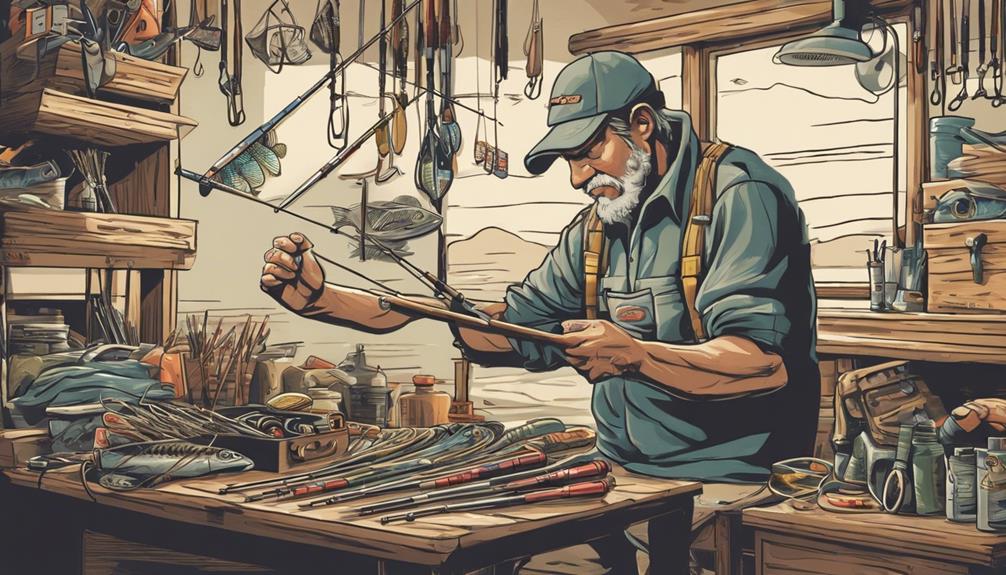
To prepare effectively for competitive angling events, establishing a consistent pre-competition routine is essential. This routine helps you focus, calm your nerves, and get into the right mindset for success.
Here are some key strategies to incorporate into your pre-competition routine:
- Mental Preparation: Engage in mental exercises to boost your confidence and focus. Visualize yourself performing well during the competition, imagine overcoming challenges, and remind yourself of your past successes to build a positive mindset.
- Physical Conditioning: Ensure your body is ready for the demands of competitive angling by incorporating physical conditioning into your routine. This could include exercises that strengthen your core, improve your endurance, and enhance your overall physical fitness.
- Visualization Exercises: Practice visualization techniques to mentally rehearse your angling strategies. Imagine yourself casting perfectly, reeling in the biggest catch, and staying composed in the face of competition pressure.
- Relaxation Techniques: Incorporate relaxation methods such as deep breathing, meditation, or listening to calming music to help reduce pre-competition jitters and keep your mind clear and focused on the task at hand.
Fishing Strategically in Competition Waters
When competing in angling tournaments, strategically positioning yourself in the competition waters can significantly impact your chances of success. Location selection plays a crucial role in determining where you should set up. Before the competition begins, scout the area to identify potential hotspots such as underwater structures, vegetation, or drop-offs where fish are likely to congregate. By understanding the behavior of the fish species you're targeting, you can make informed decisions about where to position yourself for optimal results.
Once you have identified your location, strategic positioning within that area is key. Position yourself in a way that allows you to cover a variety of fishing spots without disturbing the water too much. This may involve casting your line from different angles or adjusting your boat to drift along the desired path. By being adaptable and observant of changing conditions, you can maximize your chances of hooking the big one.
In addition to location and positioning, bait selection and a stealthy approach are essential components of fishing strategically in competition waters. Choose bait that's appropriate for the target species and conditions. Approach your fishing spot quietly to avoid spooking the fish, and make subtle movements to prevent detection. By combining these tactics with effective location selection and strategic positioning, you can enhance your competitive angling performance and increase your chances of success.
Maximizing Your Time on the Water
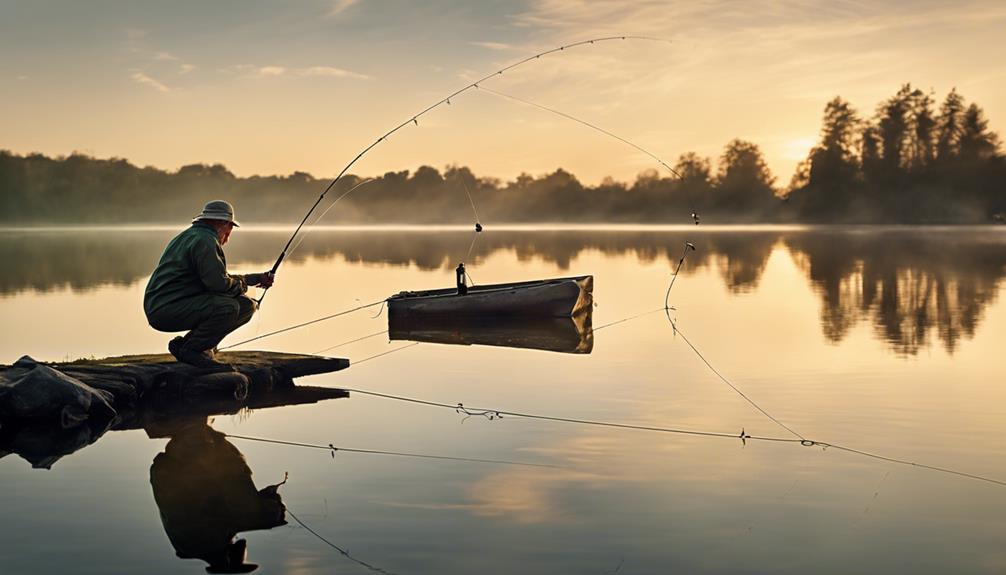
Make the most of your time on the water by prioritizing efficiency and focus. When competing in angling, time management is crucial for success. Here's how you can maximize your time on the water:
- Plan Your Route: Efficient water navigation is key to reaching different fishing spots quickly. Plot your course beforehand to minimize time spent traveling between locations.
- Use Technology Wisely: Leverage tools like GPS systems or fish finders to locate prime fishing areas faster. These devices can help you make the most of your time on the water by guiding you to where the fish are biting.
- Stay Organized: Keep your gear neatly arranged and easily accessible. Wasting time searching for equipment can take away precious moments from your fishing endeavors.
- Focus on Productivity: Avoid distractions and stay focused on the task at hand. Whether it's casting your line or analyzing the water, every moment counts in competitive angling.
Continuously Learning and Adapting
Embrace a mindset of constant improvement and adaptability to enhance your competitive angling skills. To stay ahead in the game, it's crucial to always be learning and evolving. One key aspect of this is adapting techniques based on the conditions and fish behavior. What works on one day may not work on another, so being able to switch up your approach is vital.
Studying competitors can also provide valuable insights. Observing what techniques they use, where they fish, and how they strategize can give you a competitive edge. Don't just focus on the winners; pay attention to a variety of anglers to gather a diverse range of tactics that you can incorporate into your own arsenal.
Another way to continuously learn and adapt is by seeking feedback. Whether it's from fellow anglers, coaches, or even video analysis of your own performance, feedback can highlight areas for improvement and help you refine your skills.
Frequently Asked Questions
How Important Is It to Understand the Regulations and Rules of Competitive Angling Events?
Understanding the regulations and rules of competitive angling events is crucial. Not only does it ensure fair play, but it also helps you avoid penalties or disqualification.
Are There Any Specific Techniques or Strategies for Dealing With Inclement Weather During a Competition?
When facing inclement weather during a competition, gear selection and strategy adjustment are key. Ensure you have the right equipment for varying conditions, like rain gear or warm layers.
Adapt your approach based on the weather – for example, switching to different bait or fishing deeper in response to changing conditions. Being prepared and flexible will give you an edge when the weather turns unfavorable during a fishing competition.
What Role Does Mental Preparation and Focus Play in Competitive Angling Success?
To succeed in competitive angling, mental preparation is key. Visualization exercises and positive affirmations help you stay focused and confident. Developing mental toughness is crucial when facing challenges on the water.
Breathing techniques can calm your nerves and improve concentration. By honing your mental skills, you enhance your ability to make quick decisions under pressure and adapt to changing conditions, ultimately increasing your chances of success in competitions.
How Do You Handle the Pressure of Competition and Stay Calm Under Stressful Situations?
When handling the pressure of competition and staying calm under stressful situations, stress management is key.
Practice deep breathing exercises to stay centered. Use visualization techniques to imagine success and repeat positive affirmations to boost confidence.
Is There a Certain Diet or Nutrition Plan That Can Help Improve Your Performance During Angling Competitions?
To boost your performance while angling, consider key factors like nutrition and hydration. Opt for performance enhancers like lean proteins and complex carbs to provide lasting energy.
Stay hydrated by drinking water throughout the day and avoiding sugary drinks. Proper nutrition and hydration can help you stay focused and energized during competitions, giving you an edge on the water.
Conclusion
In conclusion, to excel in competitive angling, you must focus on perfecting your casting technique, mastering different lure presentations, understanding fish behavior patterns, utilizing proper gear and equipment, developing a pre-competition routine, fishing strategically in competition waters, maximizing your time on the water, and continuously learning and adapting.
By following these top strategies, you'll increase your chances of winning and becoming a successful angler in competitive fishing tournaments. So, keep practicing, stay informed, and never stop improving your skills.
Good luck out on the water!
